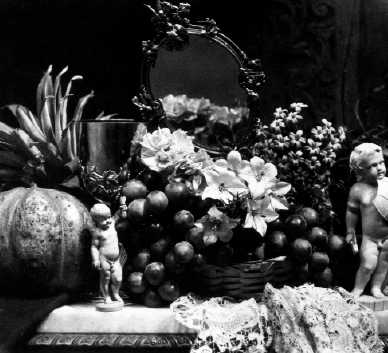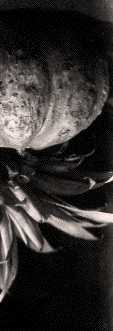Straw Men Hollow Men
Hardcore Reductionist Johnny Rich takes Steven Rose to task for fudging issues of free will...
 "Lifelines are the trajectories organisms take in time and space." If there is a central theme to the latest book by leading biologist and professional iconoclast Steven Rose, than it must be this definition. This is his response to the nature-nurture debate, one of the central issues of modern biology. Perhaps of modern life. Rose has in his sights the popular view that genes 'cause' everything from aggression to alcoholism, sexual orientation to voting Tory (there has to be some excuse). In effect, he's asking the existentialist chicken and egg question: which comes first, essence or existence?
"Lifelines are the trajectories organisms take in time and space." If there is a central theme to the latest book by leading biologist and professional iconoclast Steven Rose, than it must be this definition. This is his response to the nature-nurture debate, one of the central issues of modern biology. Perhaps of modern life. Rose has in his sights the popular view that genes 'cause' everything from aggression to alcoholism, sexual orientation to voting Tory (there has to be some excuse). In effect, he's asking the existentialist chicken and egg question: which comes first, essence or existence?
In the egg corner is Richard Dawkins: "We are survival machines - robot vehicles blindly programmed to preserve the selfish molecules known as genes." And in the chicken corner, Jean-Paul Sartre: "Man first of all exists... and defines himself afterwards... He is what he wills... One will never be able to explain one's action by reference to a given and specific human nature - in other words there is no determinism: man is free".
Throughout the book, Rose takes shots at Dawkins and his reductionist, 'ultra-Darwinist' cronies who claim that the survival of the fittest organisms is merely a reflection of a deeper battle for existence at a molecular, genetic level. While they have a point, Rose argues, it's not the whole story. Something more sophisticated, more complex, is needed. A synthesis, not simply a thesis. Complexity, Rose explains, is the key: interconnected systems and processes, not simple relationships and representations. He is keen to depict life as a fabric made up of threads none of which is life, each touching and being touched by all the others. You cannot look at genes without also considering organisms, populations, species and environments. You can't look at nature without realising that nurture is inherent. And vice versa. Life is a complex, dynamic system.
Complexity, Rose explains, is the key: interconnected systems and processes, not simple relationships and representations. He is keen to depict life as a fabric made up of threads none of which is life, each touching and being touched by all the others. You cannot look at genes without also considering organisms, populations, species and environments. You can't look at nature without realising that nurture is inherent. And vice versa. Life is a complex, dynamic system.
This was the genius of Darwin's discovery: evolution is a self-organising or autopoetic system. There is no need for a prime mover, be it God or genes. Rose extends the idea to all of nature, ruthlessly rummaging through life's processes and demonstrating how few are planned according to any genetic (or other) blueprint. Life develops because autopoetic processes make it inevitable. Autopoesis keeps heartbeats within a vital range and prey and predator in dynamic balance. Contingencies will rock the boat every now and then, but the whole will simply slosh around, finding a new level until the next wave.
For Rose, no single thing defines us, but rather a chaotic symphony whose next cadence cannot be predicted. The book concludes that "for humans, as for all other living organisms, the future is radically unpredictable... it is therefore our biology that makes us free." Unfortunately, however, his synthesis stops there. Why does he think unpredictability and freedom are the same thing? Life may be unpredictable, but, I would argue, its progression is also inexorable.  Let me explain. When confronted with a 'choice', what informs your decision? Nature, nurture or both? Dawkins says nature, Sartre says nurture and Rose says both. But when it comes to free will, the answer doesn't matter, so long as it's one of the three. This is because your nurture is as immutable as your nature. It's history, in the past. People behave according to the complex dynamic mix of biology and environment that forged them. Their futures are the inevitable extensions of the present which, in turn, is determined by the past. However, because life is complex, it is unpredictable, and therefore we experience the apparition of freedom.
Let me explain. When confronted with a 'choice', what informs your decision? Nature, nurture or both? Dawkins says nature, Sartre says nurture and Rose says both. But when it comes to free will, the answer doesn't matter, so long as it's one of the three. This is because your nurture is as immutable as your nature. It's history, in the past. People behave according to the complex dynamic mix of biology and environment that forged them. Their futures are the inevitable extensions of the present which, in turn, is determined by the past. However, because life is complex, it is unpredictable, and therefore we experience the apparition of freedom.
A truly 'free' choice is a decision made with no reference to either nature or nurture. If such exists, it must be based on something else, an element of self which arrives from the ether or the soul, if you like. But failing such recourse to theology (whether garbed in pseudo-scientific rags or not), free choice can only be a random decision. And what kind of freedom is that?
I believe Rose's definition of a 'lifeline' is flawed. Lifelines are not trajectories taken by an organism, but trajectories which organisms undergo. We may not be 'robot vehicles' as Dawkins would have us believe, but nor are we free as Sartre claims. In a footnote, Rose admits that he has taken the Sartre quotation from Mary Midgley's The Ethical Primate, not from Existentialism & Humanism itself. In so doing, he betrays that, despite the philosophical aspirations of this book, he is no philosopher. He stops, tantalisingly, where biology ends.
Lifelines simply isn't popular enough in style to be called 'popular science'. Stand it next to The Selfish Gene and it looks like little more than a counterblast. That's no bad thing, although a bit unjust since Rose is a more far-sighted scientist than Dawkins. Lifelines' achievements are greater than its stature will ever be. This is a shame because, in a purely biological sense, it lays to rest the nature-nurture debate once and for all.
Johnny RichXJohnny AT clarktv.comX
Mute Books Orders
For Mute Books distribution contact Anagram Books
contact@anagrambooks.com
For online purchases visit anagrambooks.com







